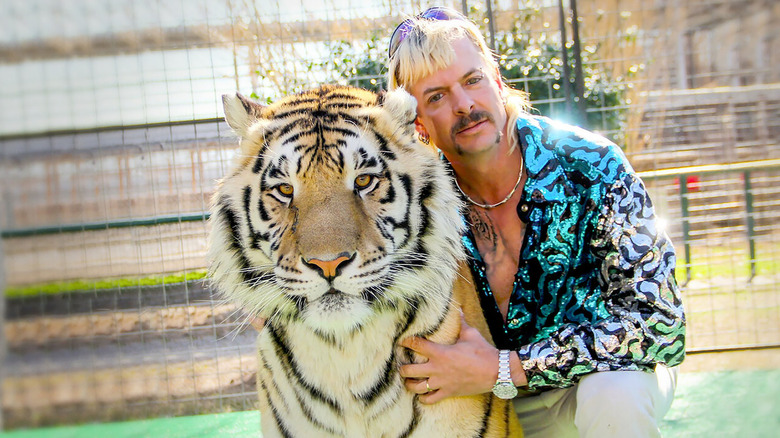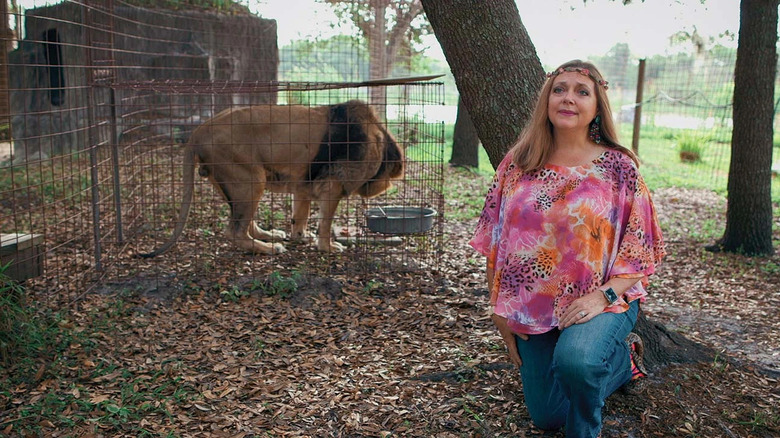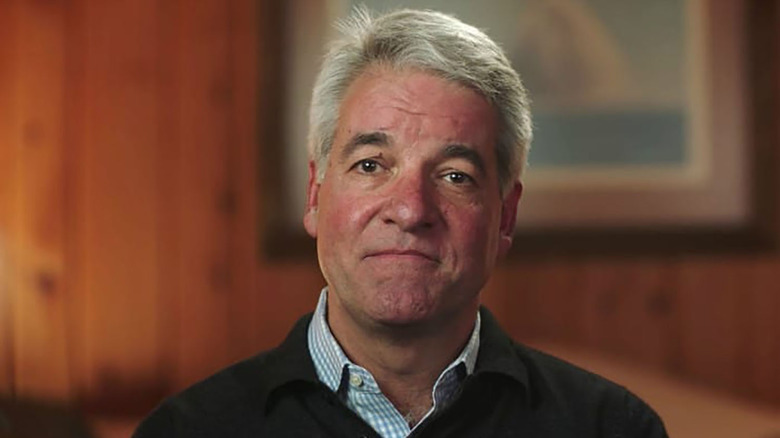Every Streamer Wants Their Own Tiger King, And Buddy, You're Not Getting Your Own Tiger King
The day was March 20, 2020. Millions of Americans were either under a stay-at-home order or were soon to be under one as a result of the COVID-19 pandemic. Things were, frankly, a little scary, and many turned to entertainment in an attempt to not think about the rising death tolls. Netflix had just released a little documentary series called "Tiger King: Murder, Mayhem, and Madness," and it became a pop culture phenomenon almost overnight. More than 34 million Americans tuned in to watch the series in its first 10 days, ranking it right up there with the debut for the beloved "Stranger Things 3." As word of mouth spread about the horrible hijinks of big cat enthusiasts Joe Exotic, Carole Baskin, and the rest of their unhinged crew, the viewership grew, and it became undeniable that "Tiger King" was the show of the early pandemic. The series became a monster hit, eventually getting a sequel series, live-action scripted versions of events, and more.
In the wake of "Tiger King," just about every streaming service has tried to capture that chaos magic. HBO Max made "McMillion$" and Apple TV+ has the upcoming "The Big Conn," while Hulu doubled down on scripted series based on true crime, like "Pam & Tommy" and "The Girl From Plainview." They're all trying to create their own "Tiger King," and it's just not going to happen. "Tiger King" owes its success to a number of different factors, and trying to get the stars to align that perfectly again is a fool's errand.
Tiger King owes a lot to the pandemic
What many of the companies trying to capitalize on the success of "Tiger King" fail to realize is that a large part of the series' success was a matter of timing. Mere weeks into the pandemic, we were all reeling and looking for something, anything, to distract us from how scary things seemed. The trashy, weird escapades of the people whose worlds revolve around big cats were the perfect kind of escape, because it felt so outside of our own reality. It wasn't feel-good TV by any stretch of the imagination, but it was a kind of schadenfreude, watching terrible people be terrible to one another. "Tiger King" has the same kind of shocking appeal as daytime TV like "Jerry Springer" or reality shows like "Hoarders" or "My 600 LB Life." The point is not to learn anything, just to point, laugh, and say, "wow, at least I'm not those guys."
While that's horribly exploitative in many instances, like the TLC shows that revel in making a spectacle of people's struggles, with "Tiger King" the ridicule felt earned. Sure, Baskin got more of it than any of the men and that's a huge problem that was at least addressed by "Tiger King 2," but these are all people who chose a public life. They aired their stories and grievances on YouTube and social media long before Netflix ever showed up, so there's really no guilt for tuning in. The real exploitation happened to the animals, and as "Tiger King 2" revealed, attention on the facilities helped get them shut down and the cats were relocated to more appropriate sanctuaries.
Other shows that have tried to capture the "Tiger King" magic similarly focus on terrible people, but the nearly mythological heights of the feud between Baskin and Exotic just weren't there. "McMillion$" has a clear villain in Jerry Jacobson, and he mostly just goes around hurting people. It has a wild cast of characters like "Tiger King," but they're not operating on the same wildly villainous levels as Baskin, Exotic, and the rest of the depraved subjects of Netflix's documentary series. Instead of watching the assured mutual destruction of terrible people, it's just the documentation of a bad person doing bad things, then eventually getting caught. Justice being served is fun, but something is missing.
Netflix understands sleaze
For better and worse, the folks at Netflix understand the power of a tabloid-esque trashiness. The streaming service has a number of thought-provoking, intelligently-made docs like "The Staircase," "Casting Jon Benet," and "Crime Scene: The Vanishing at the Cecil Hotel," but on the flip-side, they also have a whole lot of documentaries that revel in exploitation and shock value.
The Netflix Fyre Festival documentary, "Fyre," became the source of many memes because of a sequence where event producer Andy King explained the extreme lengths he went to in order to secure water for the festival. (Here's a hint: it involved sexual favors.) The documentary "Wild, Wild, Country" painted everyone involved in a less-than-stellar light, capitalizing on the intense personalities behind an Oregon cult. Even "Evil Genius" lingers on the gory details of a bank robbery-turned-murder a bit too long, though it makes for great television.
Hulu is smart in mostly sticking to scripted, dramatized versions of true crime stories instead of trying to beat Netflix at the sordid documentary game. Some of them are equally exploitative, but it doesn't feel like more of the same, just from a different streamer. HBO Max, Apple TV+, and the other streaming services that are trying to catch up and somehow luck out onto their own "Tiger King" are chasing something that's already gone extinct. People don't even really want more "Tiger King," it turns out, so why would they tune in to yet another attempt at making a true crime story feel wacky and wild?
Instead of trying to catch big cat lightning in a bottle, maybe they should try to find their own niches in the documentary world. HBO has done great work with some of their docs like "Mommy Dead and Dearest" and "Class Action Park," both of which are weird true crime that don't trade in scandal. Focus on what you're good at, streaming services, and leave the trashy stuff to Netflix. It's like the one thing they're good at these days, after all.


